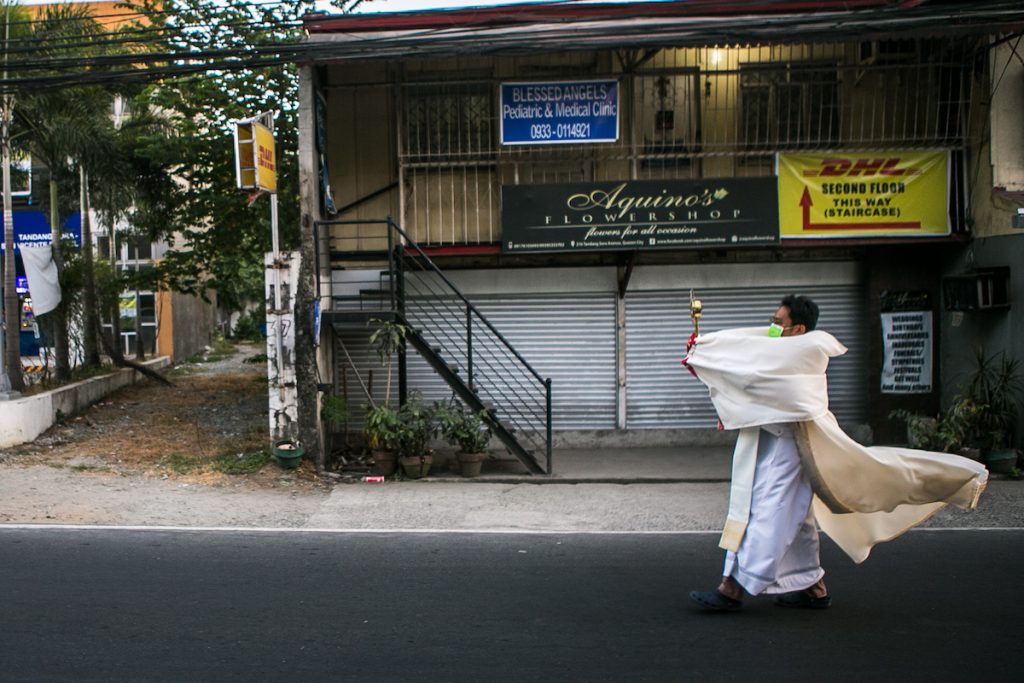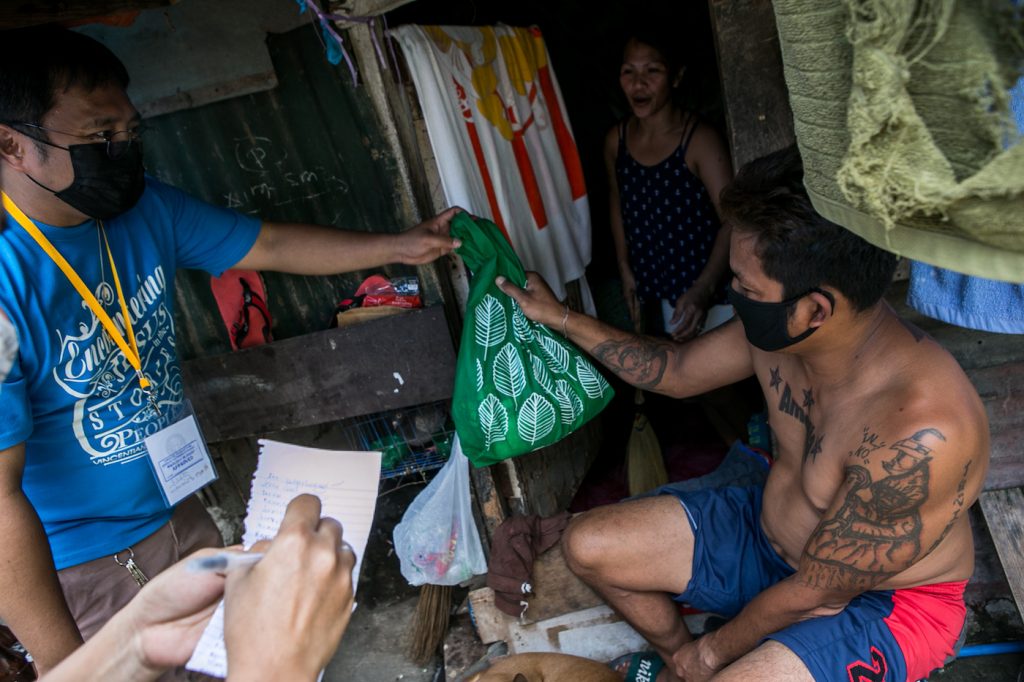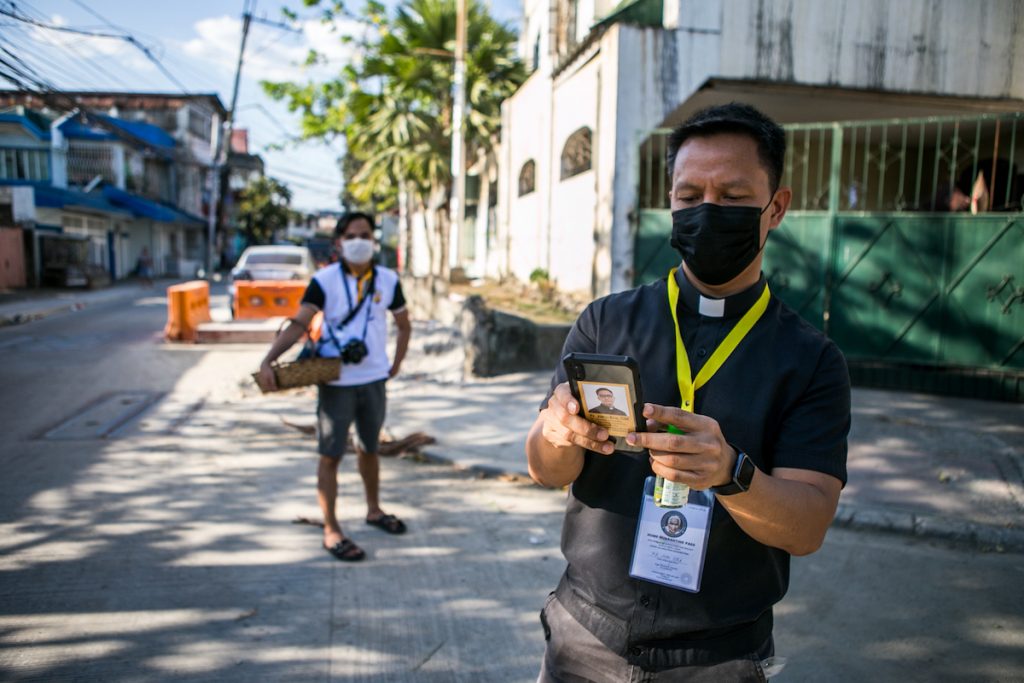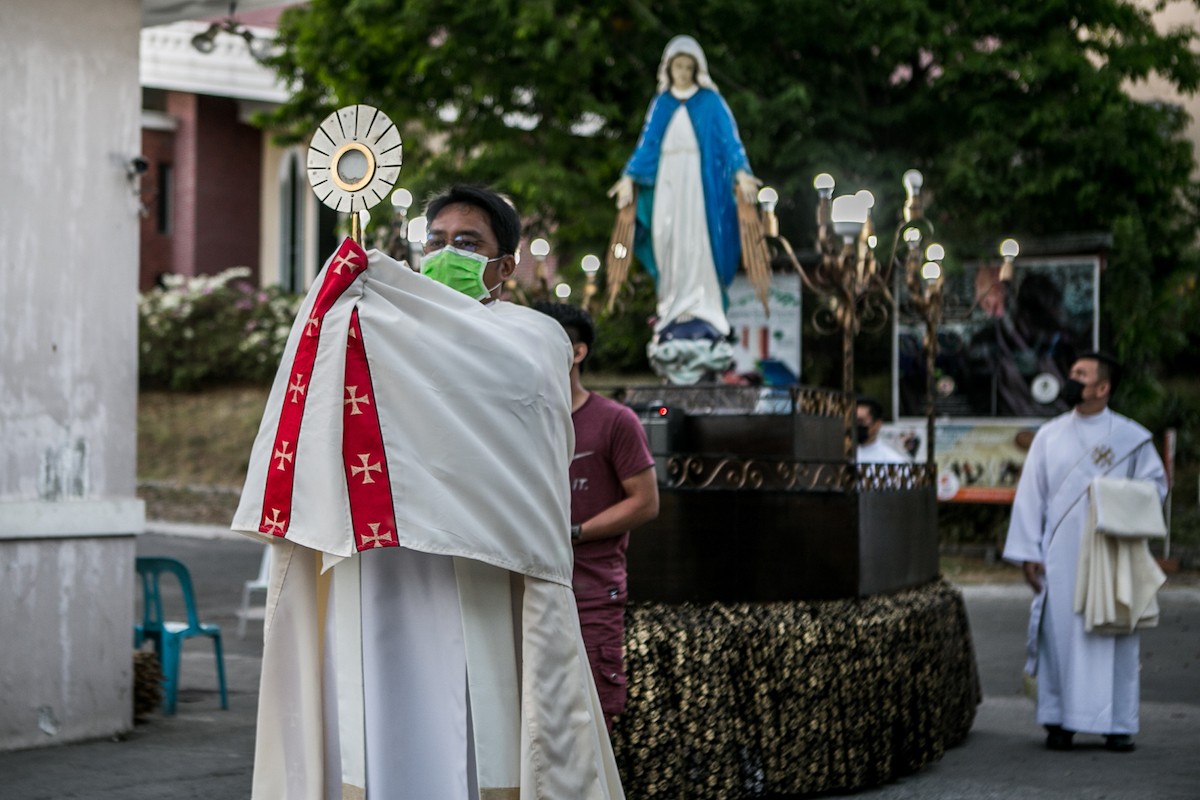A priest raised a monstrance with the consecrated Host as he walked around a village late in the afternoon before the sun sets.
It is a common sight these days in many parts of the Philippines, a predominantly Catholic country hit hard by the new coronavirus pandemic.
Father Geowen Porcincula, a Vincentian priest, walked around the village in a suburb of the capital for two hours for the public exposition of the Blessed Sacrament.
Parish youth volunteers pulled a carriage holding the Blessed Virgin Mary and followed the priest during the procession.
There were few people in the streets. Some bowed their heads, others kneeled in prayer as the procession passed.
Many were inside their homes, watching the Blessed Sacrament through the window with lighted candles in hand.
“It was so surreal,” said Father Porcincula. “This is my first time as a priest to experience a procession that people cannot come near,” he said.
“They looked so deprived,” said the priest.
Authorities have placed most of the country under enhanced community quarantine for three weeks already to contain the spread of the new coronavirus.
The lockdown forced people to stay inside their houses as schools were closed and public transportation suspended.
Public assembly, including religious gatherings, are prohibited.
“But we cannot stand life without a religious procession or a celebration of the Holy Mass, right?” said Father Porcincula.
“As Catholics, we feel thirsty if we don’t get to hear Mass,” he said.

The priest said that it was one of the reasons why he decided to hold the procession of the Blessed Sacrament despite the lockdown.
“People need spiritual nourishment especially during times of uncertainties and anxieties,” he said.
At the end of a poorly lit alley, an old woman emerged and walked toward the procession. The priest shook his head as the woman tried to get near.
“I was signaling her to stop, which she did,” said Father Porcincula.
The woman kneeled on the pavement, looked at the monstrance, made the sign of the cross, and cried.
“I felt sorry for her. I can feel her thirst. I can feel her longings,” said the priest.
Reaching out
Father Porcincula is pastoral director of the De Paul House at St. Vincent Seminary, which is run by the Congregation of the Mission, or the Vincentians.
He said it is the task of church leaders to address the spiritual hunger of the people. “That is why we have online Masses and processions even if we cannot congregate as we usually do.”
The priest said nothing can hinder the Church in reaching out to its flock. “We must continue our presence in the lives of the people despite the odds.”

Earlier on the same day, another Vincentian priest walked, this time at a relatively fast pace, “to reach out to those who want to share what they have.”
Father John Era turned his 12,500-step daily brisk-walking exercise into something beneficial for the poor in the community.
“Because people cannot get outside the house and go to church to give make their offerings, I personally go to them and receive their donations,” said the priest.
The idea started when a parishioner sent a message asking how to donate to the church during the lockdown.
The priest advised the parishioner to send it online, but the problem was many of those who wanted to donate are not familiar with online banking.
The priest coordinated his plan with village leaders and secured a “quarantine pass” that allows him to walk around the village and receive donations.
“I had to keep the proper distance of at least one meter, so I brought with me a basket where people put the envelope,” said Father Era.
“No handshake, no placing of my hand on their forehead, just a short chat, and a big thank you before I leave,” he said.
The priest posted the experience on his social media account, resulting in more text messages from the faithful who asked him to drop by to get their donations.
Father Era, director of students at the seminary, decided to make it his daily routine.
“The response was overwhelming,” he said. A lot of people were willing to give.
“We reach out not only to those who are in great need, but also to those who are willing to give and share, no matter how big or small,” he said.
Feeding the hungry
The money that Father Era collects goes to the congregation’s humanitarian aid response in poor communities affected by the lockdown due to the pandemic.
Father Era is in charge of raising funds while Father Porcincula heads the implementation of projects, including a feeding program for about 400 homeless people and street dwellers.

Father Era has to raise at least US$15,700 per week to allow Father Porcincula to deliver emergency relief packs to at least 1,300 families in poor communities that the congregation administer.
The congregation also conducts relief operations twice a week and feeding programs on Mondays, Wednesdays, and Fridays.
“The seminarians are the backbone of the relief operations,” said Father Porcincula. “The priests are just guiding them and overseeing the entire program,” he said.
“The idea of providing aid to poor communities actually came from the students,” admitted the priest.
Every day, for the past two weeks, the seminarians repack essential food and non-food items for distribution to communities.
“We cannot just sit comfortably inside the seminary while we know that a lot of families are starving,” said Rhomel Yale Frontuna, a third-year theology student.
“We know it because we live in those poor communities,” said Frontuna who has been visiting and sleeping in a shanty under a bridge during weekends for the past three years.
The seminary has been adopting communities where seminarians are encouraged to spend their weekends to immerse themselves with the people.
“When we learned that the government will implement a lockdown, we were so worried about the poor families living underneath the bridge and the families in the dumps,” said Frontuna.
As of March 29, the Vincentians were able already able to distribute relief food packs to 2,135 families and have served hot meals to 600 homeless people and frontline health workers.
“It is inherent for the Church to accompany the people in dark times. We feed the hungry. But it is imperative to nourish both body and soul,” said Father Porcincula.
He said first in their mission amid the lockdown is to feed the people, to distribute relief goods, “and third but very important is the procession of the Blessed Sacrament.”







